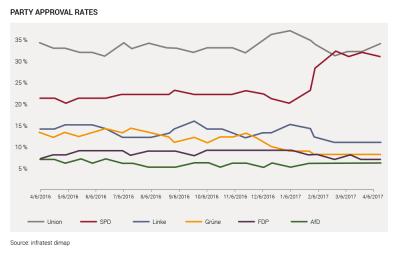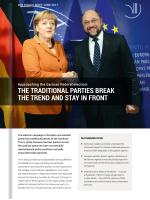Approaching the German Federal election: The traditional parties break the trend and stay in front
From being a historical bridge-builder among different sensibilities in Europe, Germany has gradually assumed a more assertive posture on key issues from the refugee crisis to Brexit negotiations. As a result, the federal election in September will be consequential not just for Germany, but also for the rest of Europe.
A closer look at the programs of the major parties reveal subtle but decisive shifts in the discourse; part of a broader trend in a Europe that has witnessed a rise of populist positions advocating stricter policies on issues such as migration and trade. The German experience has not been immune from this develop- ment, witnessing an overall conservative turn. But the political landscape has also displayed a degree of adaptation and containment of the populist message.
■ European partners should register a hardening of the German agenda across the political spectrum on issues such as internal security, integration and immigration.
■ External factors ahead of the election – such as a breakdown of the EU-Turkey refugee deal or
a cyber-attack – may shift the calculus of both contenders and voters towards more conservative positions.
Party positions
The Alternative für Deutschland, a right-wing populist party, has strong chances of entering the national parliament. Established as an opposition movement to EU nancial politics, the recent success of the party is fuelled by the refugee crisis.
In the national discourse surrounding issues of integration, the AfD has managed to shift the focus to migration as a security issue. Consequently, the AfD’s draft election platform has a strong focus on domestic security. Among many measures, the party wants to establish rigid deportation procedures, the forced return of refugee boats in the Mediterranean and placements of migrants with an unclear status in third countries. To strengthen security forces, the AfD wants to restructure the federal police, transfer riot police to the federal level, and install video surveillance with face recognition software. The party states that Islam is not a part of Germany and wants to counter radicalization by halting the construction of mosques. Family reunification of refugees and dual citizenship should be stopped.
With polls and recent state elections showing the electoral potential of the AfD, mainstream parties have adjusted to societally perceived security threats. For example, after the Berlin terror attack in December 2016, the governing parties declared their willingness to revise the security structure of Germany. Horst Seehofer, chairman of the CSU, the Bavarian sister party of Angela Merkel’s Christian Democratic Union, went a step further, stressing the need to reassess the German migration system, deliberately linking terrorism to integration politics.
The Union parties (CDU/CSU), on the right of the political scale, are taking a more rigid approach on internal security matters, in order to prevent alienating voters in the more conservative segments of the electorate. Measures suggested by the Union Parties include increased video surveillance in public areas, effective deportation procedures for criminal asylum seekers and migrants, more and better equipped police forces and transition zones at borders for refugees with an unclear status. Furthermore the Union parties are in favour of allowing the German military to support police forces in extreme scenarios such as large scale terror attacks.
The populist agenda has in effect been “mainstreamed”, making it more acceptable for traditional parties to adopt policy positions that used to be the exclusive purview of populist parties.
However promising it has proven to tap into the political potential of the public’s security concerns, the Social Democratic Party has chosen a different tack. The surprising nomination of Martin Schulz as the SPD’s candidate for Chancellor has been primarily centered on issues pertaining to social and economic inequality. Martin Schulz has argued that the Union Parties’ neoliberal politics are a primary cause for the worrying security situation in Germany. Even though the so-called “Schulz-Effect” has recently started to decline, it demonstrates that security is not the only important issue in the run-up to the elections. This notwithstanding, the SPD shares most points of the CDU’s security strategy apart from the role of the German military in domestic crisis situations and transition zones for refugees. The SPD favours a closer coordination of European security agencies to ght terrorism. On integration policies, the Social Democrats support possibilities for reuni cation of refugee families and plan to retain dual citizenship.
Moving further to the left of the spectrum, the Green Party is also in favour of better-trained police forces and video surveillance in sensible locations. In their draft election platform, the party emphasizes the need for prevention measures like programs to ght right extremism and violent Islamism. The Greens support an immigration law and the creation of a Ministry of Integration. The leftist party is opposed to increased video monitoring in public spaces and generally questions the security initiatives of the governing parties. In the party’s draft election platform they argue that domestic security threats are a conse- quence of global capitalism. The party puts emphasis on the need to overcome social and economic inequality and to strengthen civil society to facilitate integration.
The Liberals (FDP) are generally opposed to more video surveillance in public spaces. To deal with domestic security threats, they argue that police forces be strengthened. Better coordination of European intelligence is a key component of the FDP’s strategy to counter terrorism. Furthermore, they support more investments in the military and a stronger commitment in global security organizations. The party stresses the need to improve access options for refugees to the labour market and demands increased nancial contribution of the federal state to facilitate integration.

Traditional parties in front
The enduring popularity of traditional parties operating on a centrist policy-platform constitutes the main feature of this phase in the electoral campaign. A rather consistent polling over the past few months has attributed around two thirds of the electoral vote to SPD and the Union combined. Notwithstanding the inherent volatility of polling gures, this level of support is substantiated by a robust domestic discussion, which partners and neighbours of Germany should prepare for.
The first item of this discussion concerns Germany’s leadership in Europe and beyond. The gradual assumption of more responsibilities in the EU which Berlin has reluctantly accepted in the wake of the sovereign-debt crisis has culminated with the refugee crisis of 2015-2016 and is likely to continue in the upcoming Brexit negotiations. On one hand, this new posturing continues to see Germany at the centre of European consensus-building mechanisms, a role likely to return in a greater fashion after the French election.
So far, the election campaign in Europe’s pre-eminent power has revealed a high level of “securitization” around familiar themes such as immigration and multiculturalism.
The victory of Emmanuel Macron will bring renewed attention to the so-called French-German locomotive of integration, and to the issues on which Paris and Berlin will seek convergence, from defence, to the protection of the EU external border, to fiscal policies. On the other hand, Germany’s growing power in Europe has led to unilateral actions that are more deliberate and controversial than in the past; the EU-Turkey refugee deal being the clearest example. Germany defending its national interest might have been perceived as novel during the Euro-crisis, where Berlin’s stakes and priorities were so clearly at the centre of the decision-making processes. A pro-active furthering of German national interests is now a more accepted position in other policy domains too.
Secondly, the threat of populism, particularly of its far-right variant, has peaked after the Brexit vote and the election of Donald Trump in the United States. The appeal of populism may not necessarily decrease in electoral terms but will plateau in 2017, as already testified by the Dutch and French elections. The German federal election might mark the completion of a more sober and constructive turn in policy making. However, our cursory analysis of party platforms during the election suggests that, rather than being superseded, the populist agenda has in effect been “mainstreamed”, making it more acceptable for traditional parties to adopt policy positions and discursive postures on issues such as immigration or trade that used to be the exclusive purview of populist parties.
The third factor of this trend is the possible breakout of external or internal shocks intended at or resulting in a derailment of the centrist narrative. The Turkey-EU refugee-deal might at last break, as repeatedly threatened by president Erdogan, making Germany and Europe again vulnerable to uncontrolled mass arrivals. Similarly, it is indicative that the German police forces have been put on high alert notice in the month of August in response to a high-risk assessment of a terrorist attack in the run-up to the election. Lastly, there is the ever-looming possibility of a cyber-attack interfering with the campaign. In November 2016, Merkel said that a rise of cyber-attacks from Russia had been reported and that she is expecting that they will further increase in the run-up to the elections. Meeting Putin in early May, Merkel said that she knows that hybrid warfare plays an important part in the Russian military strategy. These “unknown unknowns” need to be factored into any assessment of the election campaign, and of the resilience of the present positions.
Put another way: so far, the election campaign in Europe’s pre-eminent power has revealed a high level of “securitization” around familiar themes such as immigration and multiculturalism. The enduring popularity of traditional parties is a counterintuitive trend, when compared for example with the recent election in the Netherlands, where the social- democratic party has had one of its worst showing, or France, where neither presidential candidates of the two main parties made it to the second round. But if the German case is different it is partly because traditional parties have been more successful in mainstreaming policy positions normally associated with populist parties. Despite marked nuances among the different parties, it is a trend cutting across the whole political spectrum.


